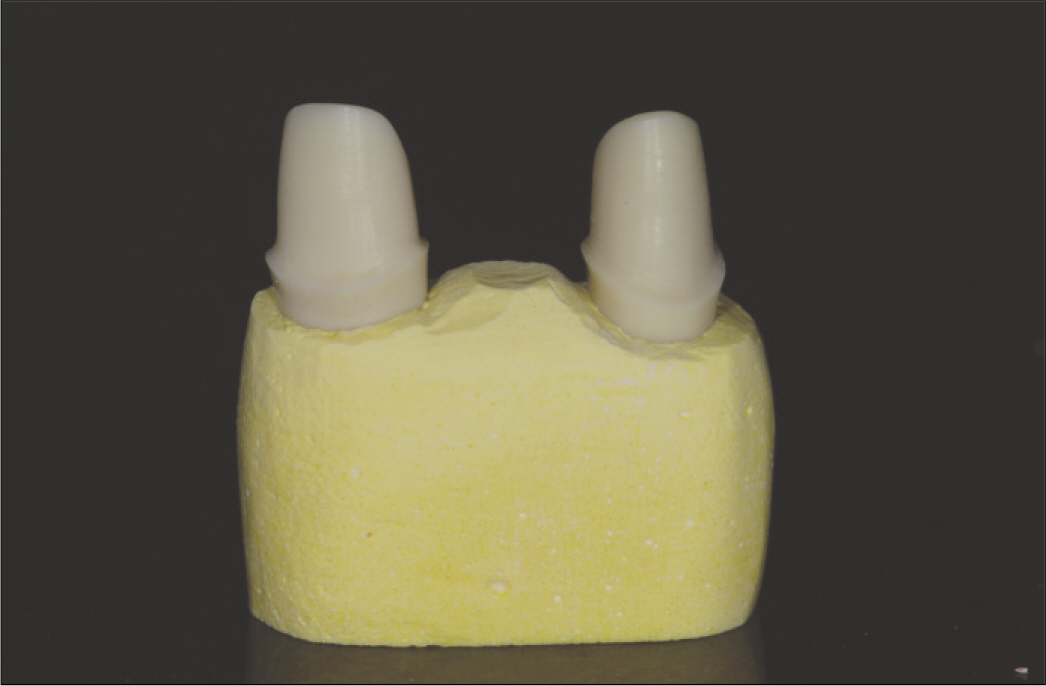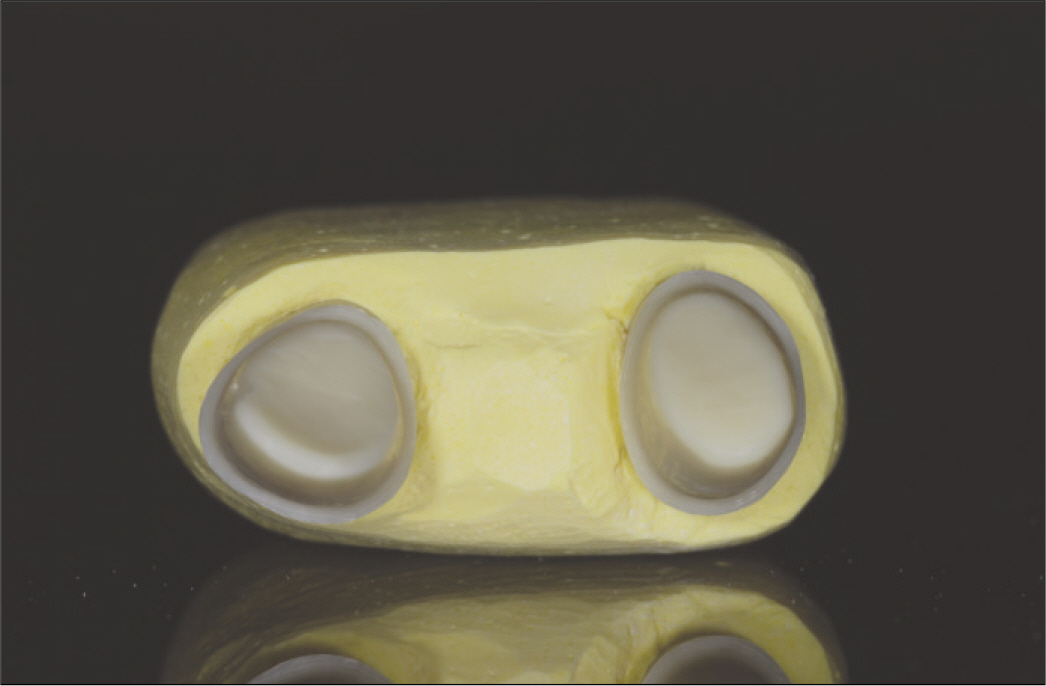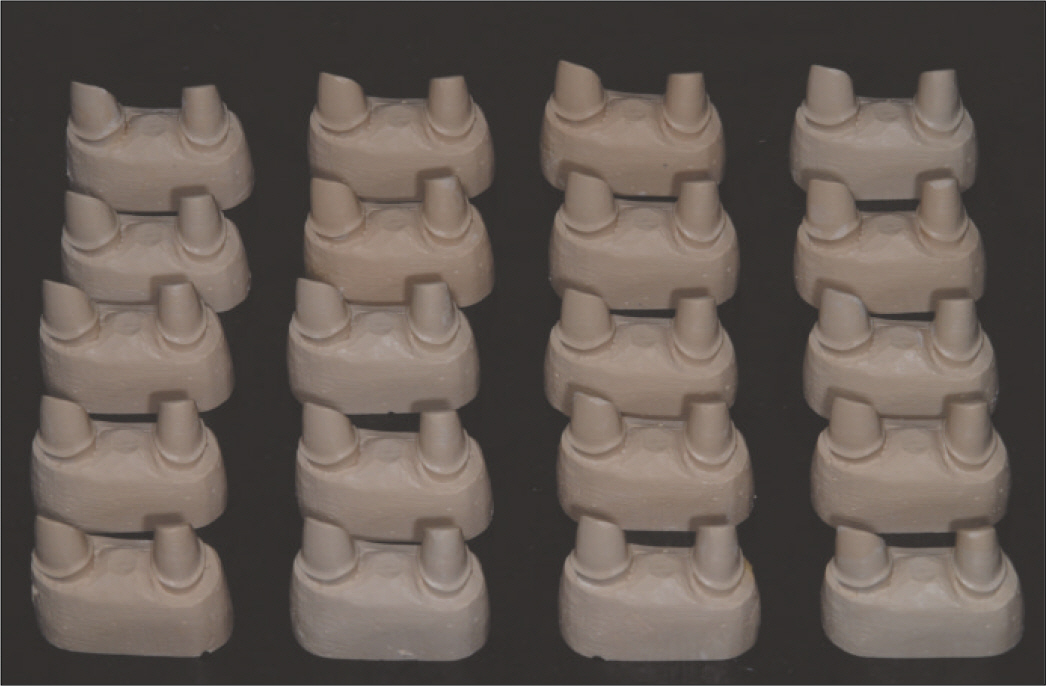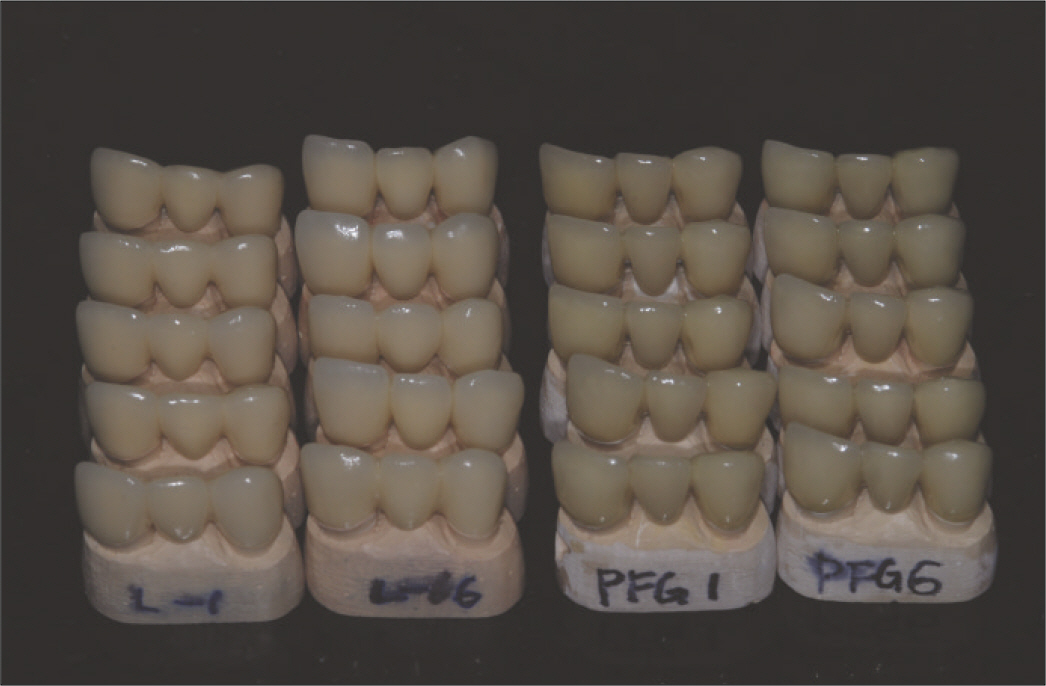J Korean Acad Prosthodont.
2011 Apr;49(2):101-105. 10.4047/jkap.2011.49.2.101.
A study on the marginal fit of CAD/CAM 3-unit bridges
- Affiliations
-
- 1Department of Prosthodontics, College of Dentistry, Seoul National University, Seoul, Korea. jhoyang@snu.ac.kr
- KMID: 2196115
- DOI: http://doi.org/10.4047/jkap.2011.49.2.101
Abstract
- PURPOSE
The purpose of this study was to assess the marginal fit of three-unit bridges produced using LAVA CAD/CAM (computer-aided design/computer-aided manufacturing) system and conventional PFG in vitro.
MATERIALS AND METHODS
#11, 13 resin teeth were prepared on dentiform, then duplicated. Twenty resin models were fabricated, ten for PFG 3-unit bridges and ten for LAVA 3-unit bridges. Each bridge was cemented on the resin model. Marginal discrepancy was measured with stereoscopic microscope (Nikon DS-Fi 1, Nikon, Japan) at a magnification of x75. Independent t-test was done for the statistical analysis.
RESULTS
The mean marginal discrepancy values and standard deviations of the PFG bridges was 97.1 +/- 18.7 microm for incisors, 76.6 +/- 21.8 microm for canines; that of the LAVA bridges was 90.4 +/- 26.7 microm for incisor, 110.2 +/- 30.2 microm for canines. The mean marginal discrepancy between PFG and LAVA for incisor did not show significant difference (P>.05). But for canine, the mean marginal discrepancy of PFG bridges was smaller than that of LAVA bridges (P<.05).
CONCLUSION
The LAVA CAD/CAM 3-unit bridges and the PFG 3-unit bridges showed clinically acceptable marginal discrepancy.
Keyword
Figure
Reference
-
1.Reich S., Wichmann M., Nkenke E., Proeschel P. Clinical fit of all-ceramic three-unit fixed partial dentures, generated with three different CAD/CAM systems. Eur J Oral Sci. 2005. 113:174–9.
Article2.Pro¨bster L. Four year clinical study of glass-infiltrated, sintered alumina crowns. J Oral Rehabil. 1996. 23:147–51.
Article3.Ode′n A., Andersson M., Krystek-Ondracek I., Magnusson D. Five-year clinical evaluation of Procera AllCeram crowns. J Prosthet Dent. 1998. 80:450–6.4.Odman P., Andersson B. Procera AllCeram crowns followed for 5 to 10.5 years: a prospective clinical study. Int J Prosthodont. 2001. 14:504–9.5.Sailer I., Fehe′r A., Filser F., Gauckler LJ., Lu ¨thy H., Ha¨mmerle CH. Five-year clinical results of zirconia frameworks for posterior fixed partial dentures. Int J Prosthodont. 2007. 20:383–8.6.Tinschert J., Natt G., Mautsch W., Augthun M., Spiekermann H. Fracture resistance of lithium disilicate-, alumina-, and zirconia-based three-unit fixed partial dentures: a laboratory study. Int J Prosthodont. 2001. 14:231–8.7.Filser F., Kocher P., Weibel F., Lu¨thy H., Scha¨rer P., Gauckler LJ. Reliability and strength of all-ceramic dental restorations fabricated by direct ceramic machining (DCM). Int J Comput Dent. 2001. 4:89–106.8.Raigrodski AJ., Chiche GJ., Potiket N., Hochstedler JL., Mohamed SE., Billiot S., Mercante DE. The efficacy of posterior three-unit zirconium-oxide-based ceramic fixed partial dental prostheses: a prospective clinical pilot study. J Prosthet Dent. 2006. 96:237–44.
Article9.Piwowarczyk A., Ottl P., Lauer HC., Kuretzky T. A clinical report and overview of scientific studies and clinical procedures conducted on the 3M ESPE Lava All-Ceramic System. J Prosthodont. 2005. 14:39–45.
Article10.Suttor D., Bunke K., Hoescheler S., Hauptmann H., Hertlein G. LA-VA—the system for all-ceramic ZrO2 crown and bridge frameworks. Int J Comput Dent. 2001. 4:195–206.11.Goldman M., Laosonthorn P., White RR. Microleakage-full crowns and the dental pulp. J Endod. 1992. 18:473–5.
Article12.Valderhaug J., Birkeland JM. Periodontal conditions in patients 5 years following insertion of fixed prostheses. Pocket depth and loss of attachment. J Oral Rehabil. 1976. 3:237–43.13.Valderhaug J., Heloe LA. Oral hygiene in a group of supervised patients with fixed prostheses. J Periodontol. 1977. 48:221–4.
Article14.Lang NP., Kiel RA., Anderhalden K. Clinical and microbiological effects of subgingival restorations with overhanging or clinically perfect margins. J Clin Periodontol. 1983. 10:563–78.
Article15.Felton DA., Kanoy BE., Bayne SC., Wirthman GP. Effect of in vivo crown margin discrepancies on periodontal health. J Prosthet Dent. 1991. 65:357–64.
Article16.Jacobs MS., Windeler AS. An investigation of dental luting cement solubility as a function of the marginal gap. J Prosthet Dent. 1991. 65:436–42.
Article17.Reports of councils and bureau: revised Americal National Standard Institute American Dental Association (ANSI-ADA) specification no.8 for zinc-phosphate cement. J Am Dent Assoc. 1978. 96:121.18.Ostlund LE. Cavity design and mathematics: their effect on gaps at the margins of cast restorations. Oper Dent. 1985. 10:122–37.19.Sulaiman F., Chai J., Jameson LM., Wozniak WT. A comparison of the marginal fit of In-Ceram, IPS Empress, and Procera crowns. Int J Prosthodont. 1997. 10:478–84.20.McLean JW., von Fraunhofer JA. The estimation of cement film thickness by an in vivo technique. Br Dent J. 1971. 131:107–11.
Article21.Gulker I. Margins. N Y State Dent J. 1985. 51:213–5. 217.22.Moldovan O., Rudolph H., Quaas S., Bornemann G., Luthardt RG. Internal and external fit of CAM-made zirconia bridge frameworks-a pilot study. Dtsch Zahna¨rztl Z. 2006. 61:38–42.23.Bindl A., Mo¨rmann WH. Fit of all-ceramic posterior fixed partial denture frameworks in vitro. Int J Periodontics Restorative Dent. 2007. 27:567–75.24.Romeo E., Iorio M., Storelli S., Camandona M., Abati S. Marginal adaptation of full-coverage CAD/CAM restorations: in vitro study using a non-destructive method. Minerva Stomatol. 2009. 58:61–72.25.Kohorst P., Brinkmann H., Li J., Borchers L., Stiesch M. Marginal accuracy of four-unit zirconia fixed dental prostheses fabricated using different computer-aided design/computer-aided manufacturing systems. Eur J Oral Sci. 2009. 117:319–25.
Article26.Cavalcanti AN., Foxton RM., Watson TF., Oliveira MT., Giannini M., Marchi GM. Y-TZP ceramics: key concepts for clinical application. Oper Dent. 2009. 34:344–51.
Article27.Mizrahi B. The anterior all-ceramic crown: a rationale for the choice of ceramic and cement. Br Dent J. 2008. 205:251–5.
Article28.Kunii J., Hotta Y., Tamaki Y., Ozawa A., Kobayashi Y., Fujishima A., Miyazaki T., Fujiwara T. Effect of sintering on the marginal and internal fit of CAD/CAM-fabricated zirconia frameworks. Dent Mater J. 2007. 26:820–6.
Article
- Full Text Links
- Actions
-
Cited
- CITED
-
- Close
- Share
- Similar articles
-
- Marginal fit of the digident CAD/CAM zirconia ceramic crowns
- Marginal fit of three different nanocomposite inlays fabricated with computer-aided design/computer-aided manufacturing (CAD/CAM) technology: a comparative study
- Effect of span length on the fit of zirconia framework fabricated using CAD/CAM system
- Influence of porcelain veneering on the marginal fit of Digident and Lava CAD/CAM zirconia ceramic crowns
- Marginal fit of anterior 3-unit fixed partial zirconia restorations using different CAD/CAM systems





